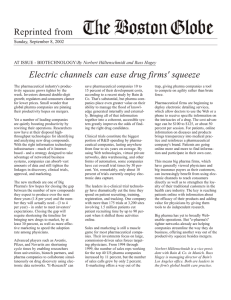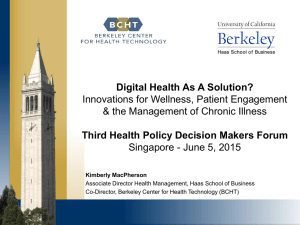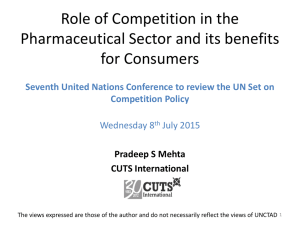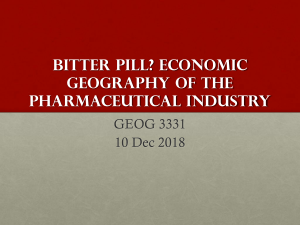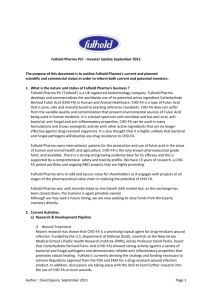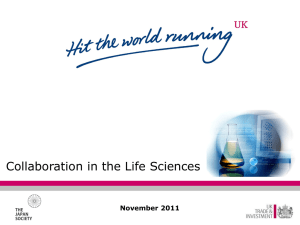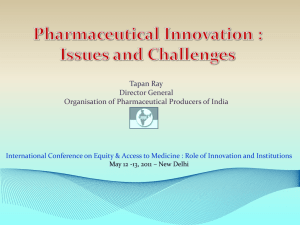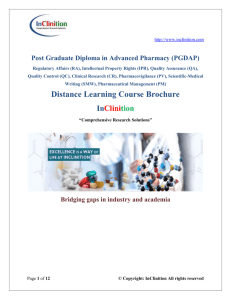Exploring ways to make India a hub for Clinical research
advertisement
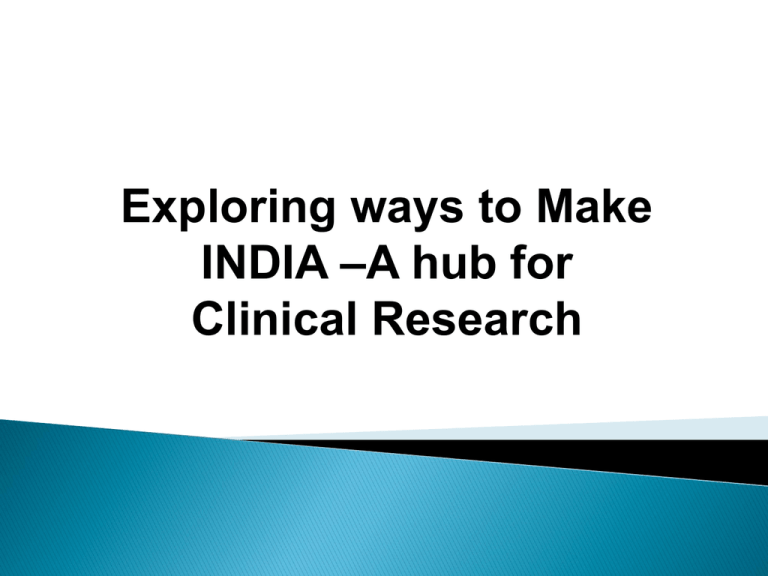
Exploring ways to Make INDIA –A hub for Clinical Research The Indian Pharmaceutical Industry is highly fragmented with about 24,000 players (330 in the organized sector). The top ten companies make up for more than a third of the market. The market is dominated majorly by branded generics which constitutes of nearly 70% to 80% of market. The IPM is valued at Rs 750 bn for the year ending March 2014.The growth in 2014 was subdued at 6% Year over year vs 12% in 2013. The growth was impacted as the drug price control order (DPCO) issued notice to bring 348 drugs under price control. The Indian pharma market remains one of the fastest growing pharma markets in the world. Currently the IPM is third largest in terms of volume and thirteen largest in terms of value. ` Considered a global clinical trial hub three years ago, India has suffered a series of setbacks, with its apex court, the Supreme Court in early 2013 revoking the Ministry of Health’s right to clear clinical trials in the country, reports New regulations and problematic clauses that followed have sounded the death knell on trials, with the number of clinical trials slipping to 19 in 2013, as compared to 500 in 2011. It is not just clinical trials that have been brought to a grounding halt The move has also affected the number of new drug discoveries in India. 16.4 billion : Domestic Pharma Market in FY13 84.9 billion Estimated Pharma market size in 2020 15.6 billion Pharma exports in FY13 73% Share of Indian Companies in the Pharma Market in 2013 5% Pharma FDI as a share of total FDI in ndia in FY!4 Indian Pharmaceutical Industry is expected to grow at 19%. India is now among the top five pharmaceutical emerging markets There will be new drug filings, Phase II clinic trials throughout the year Increasing sales of generic medicines, continued growth in chronic therapies and greater penetration in Rural Markets. The increasing population of Higher Imcome group in the country will open a potential US$ 8 billion market for multinational companies selling costly drugs by 2015.Besides the domestic market is estimiated to touch US $20 Billion by 2015 making India a lucrative destination for clinical trails for global gaints. As per extant policy, FDI up to 100 per cent, under the automatic route, is permitted in the pharmaceutical sector for Greenfield investment. 100 % FDI is also permitted for investments in existing companies under the government approval route. The Government of India has also put in place mechanisms such as the Drug Price Control Order and the National Pharmaceutical Pricing Authority to address the issue of affordability and availability of medicines. India plans to set up industrial parks in the pharmaceutical and information technology (IT) sectors in China to strengthen India-China trade and investment ties. The government is planning and executing a number of initiatives to strengthen the institutional machinery, mandatory registration of clinical trials, registration of stakeholders (CROs, ethics committees, investigator sites and investigators), enhanced monitoring and oversight e-governance of the entire drug approval process. Highest global standards. The growth in Indian domestic market will be boosted by increasing consumer spending, rapid urbanization, increasing healthcare insurance and so on. The lifestyle segments such as cardiovascular, anti-diabetes, anti-depressants and anti-cancers will continue to be lucrative and fast growing owing to increased urbanization and change in lifestyle patterns. Going forward, better growth in domestic sales will depend on the ability of companies to align their product portfolio towards these chronic therapies as these diseases are on the rise. In various global markets, governments have been taking several cost-effective measures in order to bring down healthcare expenses. Thus, governments are focusing on speedy introduction of generic drugs into the market. This too will benefit Indian Pharma companies. The main opportunities for the Indian pharmaceutical industry are in the areas of: generics (including biotechnology generics) biotechnology outsourcing (including contract manufacturing, information technology (IT) and R&D outsourcing). Drug manufacturers are currently the most aggressive overseas investors of all Indian industries. They are pursuing foreign acquisitions due to their need to: • Improve global competitiveness • Move up the value chain • Create and enter new markets • Increase their product offering • Acquire assets (including research and contract manufacturing firms, in order to further boost their outsourcing capabilities) and new products • Consolidate their market shares India a critical destination to conduct clinical research and pave the way for it to emerge as a clinical research hub in future: There are numerous government-funded medical and pharmaceutical institutions with state-of-the-art facilities. India boasts of well-trained and qualified manpower, well versed in English cost efficiency, India is better as the cost to conduct a trial here is lower by 50 to 75% than in the United States or the European Union. R&D costs in India are substantially less than those in the developed world it is possible to conduct both new drug discovery research and novel drug delivery system programmes at competitive rates. Competent staff Legal and financial framework Information Technology Globalization India being a land of diversity where Ayurveda, Unani, Siddha, and Homeopathy are practiced, clinical studies for evaluation of various alternate systems of medicine should also be conducted. India has been increasingly attracting collaborative contract proposals for conducting clinical trials and many entrepreneurs have already come forward to set up their Clinical Research Organizations (CROs). To achieve its goal of becoming a global centre of clinical trials, the country has to overcome few challenges.
